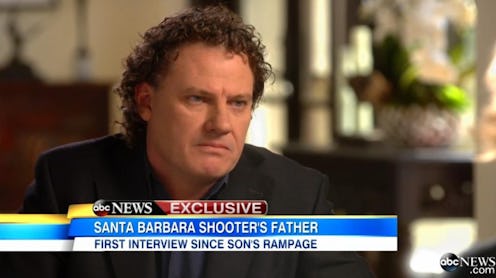News
Elliot Rodger's Father Speaks Out

A month after his son went on a deadly shooting spree, killing six people near the campus of UC Santa Barbara, Peter Rodger has spoken out, calling it his "duty" to prevent more such grisly killings. His son Elliot Rodger, 22, committed the string of murders, in addition to injuring 13 others, before taking his own life, leaving parents, victims, and a community of traumatized onlookers in his violent wake. Now, in an interview with Barbara Walters airing Friday, Peter Rodger opened up about his son's brutal crimes, and his hope of preventing such a tragedy from happening again.
Rodger and Richard Martinez, the father of slain student Christopher Martinez, have made high-profile calls for change in the aftermath of the attack. Martinez, in the days and weeks following his son's death, mounted wrenchingly-emotional appeals for reforms to curb gun violence, and the two fathers have met privately to share their thoughts. While it's not yet fully known what Rodger will discuss in his interview — you can watch the whole thing Friday night at 10 p.m. PT, on ABC News — released excerpts describe the "reverse nightmare" Rodgers said he's now living in.
When you go to sleep normally you have a nightmare and you wake up and oh, everything is OK. No I go to sleep, I might have a nice dream, and then I wake up and slowly the truth of what happened dawns on me. And that is that my son was a mass murderer.
Rodger also echoed Martinez's sentiments about gun laws. At least, insofar as wishing his son's run-in with the police, which happened a full month before his rampage, had triggered a check into whether he'd recently purchased any weapons.
If they did do a gun check, they would know that Elliot had bought three automatic weapons. They would have the right to seize him for 24 hours, and his whole scheme would've been over and thwarted.
As Barbara Walters alludes to in introducing the interview, Rodgers is the first parent of a mass-shooter to speak out in such a way. In addition to the interview, he's started a website, AskForHelp.org, which calls for readers to submit their stories of familial mental illness, and culls resources to aide people in, well, asking for help. At the very top of the submissions sits Rodger's own letter, also provided to ABC News, laying out what he hopes he can add in the future.
My duty now is to do as much as I can to try and stop this from happening again. It will be a long journey involving the personal choices of individuals and families, public discussions, mental health reforms, a change in the culture — you name it. My sincere hope is that I can help by telling my story.
Image: ABC News